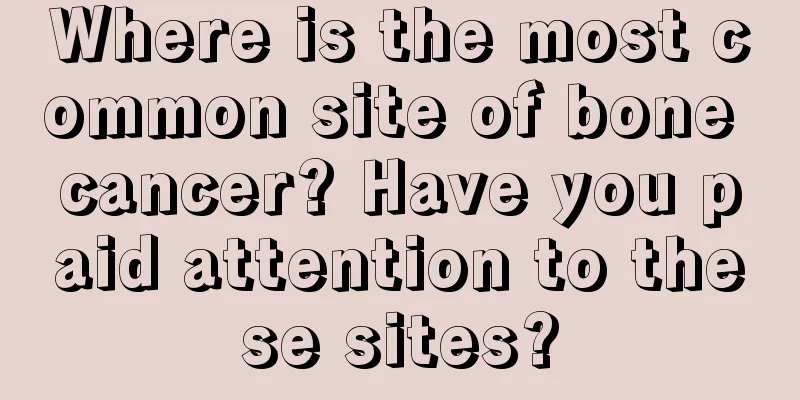Congenital myelomeningocele

|
Congenital diseases are often discovered when a child is born. For example, in the case of congenital myelomeningocele, a child will have a cyst on the midline of the back, neck, chest, etc., and the cyst may be large or small. When the baby cries, the cyst will grow larger. This is the case of congenital myelomeningocele. The earlier this disease is treated, the better, and the cure rate is very high, and it will not affect your future life. Clinical manifestations Local mass When the baby is born, a cystic tumor can be seen in the midline of the back, neck, chest or lumbar region. They range from the size of a date to gigantic. The lumps are round or oval in shape. Most have a wide base, while a few are ribbon-shaped. The surface skin is normal, but sometimes it is scar-like and thin. If ulceration has occurred, the surface may appear granulomatous or infected. If the mass has ruptured, cerebrospinal fluid will flow out from the surface of the mass. When the baby cries, the mass grows larger, and when pressure is applied to the mass, the anterior fontanelle bulges. It showed that the bulging mass was connected to the subarachnoid space. In the mass translucency test, simple meningocele has a high degree of translucency, while those containing spinal cord and nerve roots may sometimes have shadows inside the mass. This type of meningocele and myelomeningocele combined with lipoma has a fat mass on the surface and a meningocele sac deep inside. Symptoms of nerve damage Simple meningocele may not cause neurological symptoms. Patients with myelomeningocele and developmental malformation and degeneration of the terminal spinal cord, forming a syringomyelia, often have more severe symptoms, with varying degrees of paralysis of both lower limbs and incontinence. The serious neurological damage symptoms caused by lumbar and sacral lesions are far more common than those caused by cervical and thoracic lesions. Myelomeningocele itself constitutes a tethered cord, and the tethered cord syndrome becomes more severe with age and height increase. Spinal cord exposure usually presents with severe neurological symptoms, which also depends on the extent of the spinal cord malformation. Other symptoms In a few cases, meningocele extends into the chest, abdomen, and pelvic cavity, causing symptoms of lumps and compression of internal organs. Some children with meningocele have hydrocephalus and other malformations and show corresponding symptoms. Disease treatment In principle, these diseases are suitable for surgical treatment. The key points of the operation are: 1) to remove the meningocele sac and repair the soft tissue defect. Simple meningocele can be cured by this operation; 2) to explore the bulging of the spinal cord and nerves into the meningocele sac. Free and decompose it so that it can be returned to the spinal canal. It should not be removed blindly; 3) During the operation for myelomeningocele, it is usually necessary to expand the range of the laminectomy upward and downward to facilitate exploration and treatment within the spinal canal, and to facilitate the return of the bulging nerve tissue; 4) When combined with hydrocephalus and symptoms of increased intracranial pressure, a hydrocephalus shunt is performed first to relieve intracranial pressure, and the second step is to perform meningocele resection and repair; 5) Meningocele masses that extend to the chest, abdomen, and pelvic cavity often require laminectomy and combined surgery in the chest, abdomen, and pelvis. The timing of surgery recommends early surgery. For infants and young children with myelomeningocele, their overall condition and ability to withstand surgery must also be considered. Infants and young children with complete lower limb paralysis and incontinence were considered contraindications for surgery in the past. However, with the development of anesthesia and microsurgery technology, surgery can be performed selectively and may also achieve good results. |
<<: What's going on when I find my urine is very yellow when I go to the toilet?
>>: How to treat hypospadias diverticulum?
Recommend
How to use ice and fire moxibustion
Many media are now reporting on ice and fire moxi...
What are the early symptoms of colon cancer
Colorectal cancer refers to malignant tumors that...
This bulge in the area actually endangers breathing
Scoliosis refers to a spinal deformity in which o...
How to exercise to reduce belly fat
Recently, many people have fat on their bellies, ...
What are the symptoms of high alt alanine aminotransferase
High alt alanine aminotransferase will definitely...
Will I lose or gain weight after partial thyroidectomy for thyroid cancer
Patients with thyroid cancer who undergo hemithyr...
How to treat acne caused by lung heat
Many people have acne on their faces, especially ...
Home care for advanced gallbladder cancer
Gallbladder cancer is a disease that troubles man...
Lose weight and become chopstick-thin legs in one week
First of all, we need to understand that slimming...
What factors can cause lung cancer
The lungs and respiratory tract are open organs t...
How to remove oil stains from cotton clothes
If we want to remove oil stains on cotton-padded ...
What are the symptoms of early gastric cancer? Here are three points to note
There are many differences in the symptoms of ear...
What are the symptoms of ovarian cancer?
Ovarian cancer is one of the common tumors of the...
I can't hear because of inflammation
People's bodies are often prone to getting in...
How to make slimming vinaigrette
In rural areas, sweet potatoes are a very popular...









